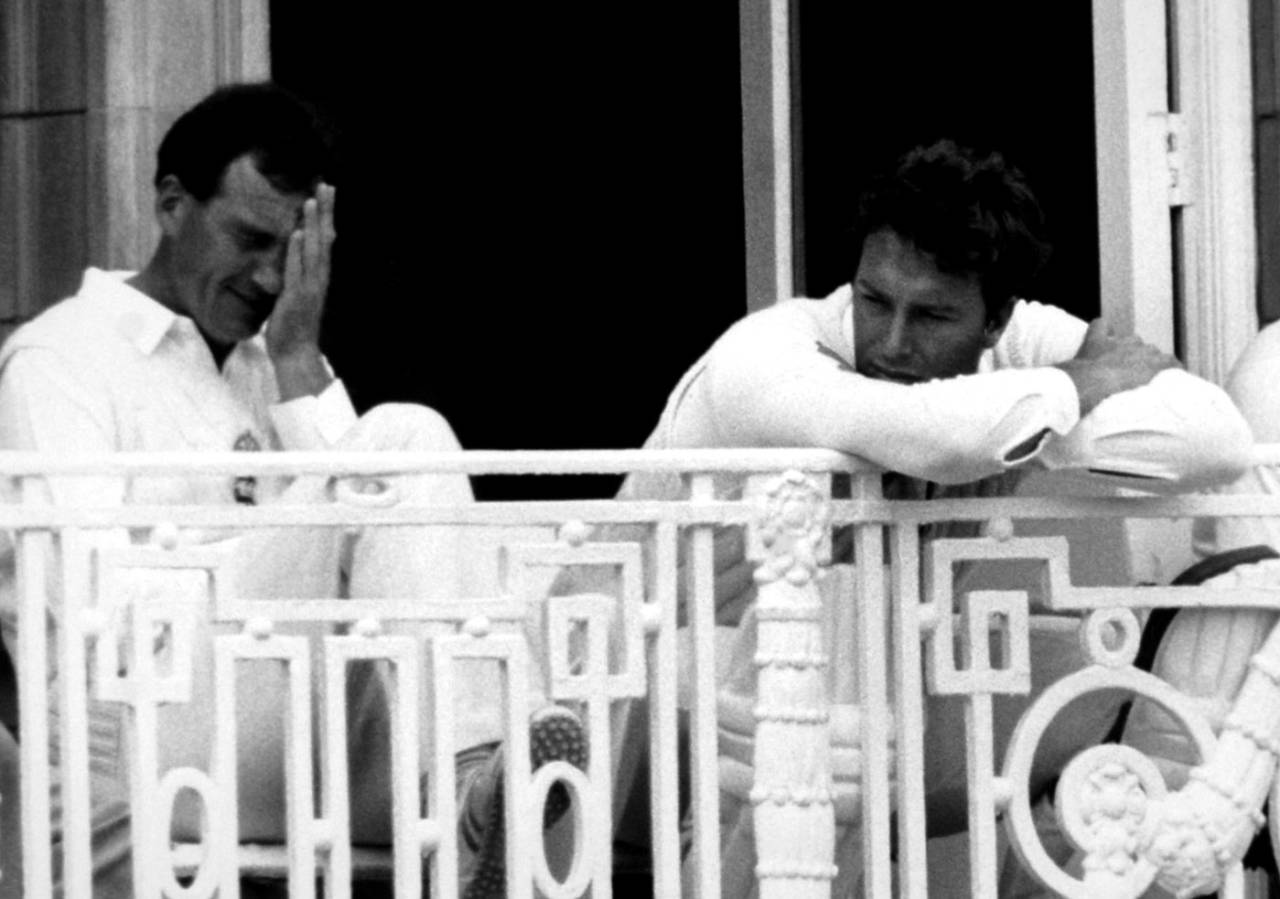What is your favourite memory of England dysfunctionality from the late 1980s until the turn of the century? Defeat at home to New Zealand
in 1999, sending them bottom of the Test rankings, perhaps. The
1994-95 Ashes tour, on which even the physio got injured and the one-day series final was contested by Australia and Australia A, was pretty painful. It is hard to look beyond the summer of 1989, when England
lost 4-0 and used 29 different players against "the worst team ever to leave Australia".
A front runner - if that is not an oxymoron - would have to be the season that Neil Robinson documents in
Long Shot Summer. Although less referenced these days, perhaps because it featured another
heavy defeat to a predictably dominant West Indies rather than the old Ashes enemy, perhaps because the hokey-cokey selection issues were to be surpassed the following year, 1988 offered up some vintage material and deserves its spot in the crowded annals of an era of incompetence.
It was, as the book's subtitle explains, "The year of four England cricket captains". Not to mention 23 players over five Tests against West Indies, plus another five - including four debutants - in the
one-off match against Sri Lanka that followed. In all, 34 players were selected in England's Test and ODI squads and 31 of them were capped. Playing for the national team was a lottery with very few winners.
These were the good old bad old days, when an appreciation of black comedy was what got England fans through. The
Guardian's Mike Selvey always seemed to be ready with a quip - Monte Lynch's inclusion in the Texaco Trophy squad prompted "a theory that it was lunch
Gatting wanted" - but Robinson, the MCC librarian, plays a fairly straight bat in his retelling, using interviews with most of the key actors as well as a wealth of contemporaneous reporting to reconstruct the narrative.
To be fair to Peter May and his selection panel, they were not done many favours by the players. Under Mike Gatting, England had won the Ashes in Australia
in 1986-87 - Martin Johnson's gag that the only three things wrong with the team were "they can't bat, can't bowl, can't field" proving premature - but then lost at home
to Pakistan. The following winter included a World Cup on the subcontinent as well as tours
to Pakistan and
New Zealand but England would not be able to call on
Ian Botham, who was playing Sheffield Shield cricket with Queensland, or David Gower, who settled instead on "a trip to Africa, a skiing holiday in Europe and a visit to the Winter Olympics in Calgary".
Graham Gooch, with a young family to consider, only made himself available for the first half of the programme.
England did manage to reach the 1987 World Cup final but lost one and drew six Tests on their travels; from the Boxing Day Test of 1986, their winless run eventually extended to August 1988, encompassing
18 matches. Such poor form, not to mention controversies including
the Shakoor Rana affair, all contributed to the pressure on Gatting ahead of the first West Indies Test.
Although England managed
a draw at a suspiciously lifeless Trent Bridge, ending a run of ten consecutive defeats to West Indies, Gatting was about to be bombed out regardless. He was undone by another staple of the times, a tabloid sex scandal. With Botham injured, the England captain was a prime target for the red-top press and Gatting's alleged activities with a barmaid called Louise Shipman at the Rothley Court Hotel gave the selectors their excuse.
Robinson actually goes to the length of tracking down Shipman and exposes the anatomy of a tabloid fit-up - for that was exactly what it was, given how Shipman's "testimony" was misrepresented. It was five years before Shane Warne arrived in England to leave an instant mark on the Ashes but Gatting was never more a victim of spin than here.
Thereafter came the brief reign of
John Emburey and the even briefer captaincy of
Chris Cowdrey. An encouraging start in the second Test,
at Lord's, where West Indies slipped to 54 for 5, ultimately ended in another defeat, and by the time the teams convened
at Old Trafford, the correspondent of the
Telegraph had settled for England winning the over-rate battle. Cowdrey, appointed by his godfather,
"Uncle Peter", took over for
Headingley - with Emburey dropped altogether - but injury ruled him out of the
final Test, at The Oval. Cowdrey had been told he would lead the team on their next tour, to India; he ended up never playing for England again.
Gooch was next in the firing line, though an injury sustained in the field meant England ended the series being led by their fifth captain, Derek Pringle. For all involved it was, as Robinson writes, a period in which "young hopefuls would find themselves loaded into the breach as the selectors aimed a series of long shots towards the seemingly bulletproof West Indies". Humiliation was complete when BBC viewers were denied seeing the winning runs in England's only Test success, against Sri Lanka, because Australian soap Neighbours was still being broadcast. Long shit summer might have been more apt.
Long Shot Summer
by Neil Robinson
Amberley Publishing
224 pages, £14.99



